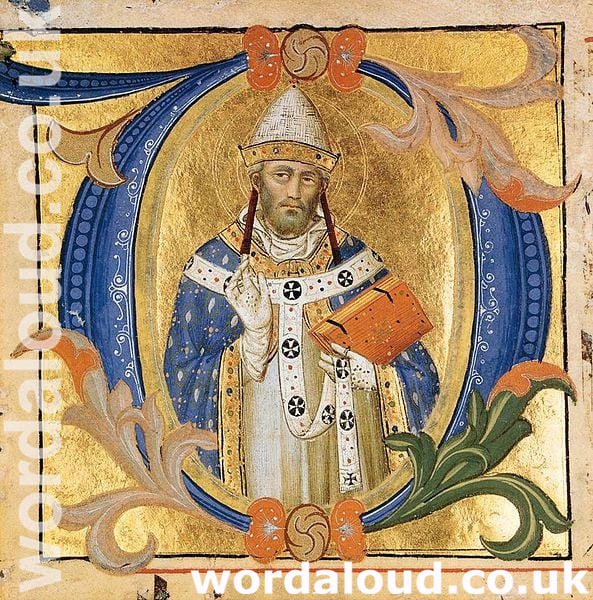Office Of Readings | Tuesday, Lent Week 2 | A Commentary Of Saint Augustine On Psalm 140
‘The passion of the whole body of Christ.’
Saint Augustine
Saint Augustine’s commentary on Psalm 141 presents the suffering of Christ as inseparable from the suffering of the Church. Saint Augustine interprets the Psalmist’s plea—“Lord, I have cried to you, hear me”—as the voice of Christ in his human nature, but also as the voice of his body, the Church. This identification between Christ and the Church is fundamental to Saint Augustine’s theology. The trials of the faithful are not isolated events; they are part of the ongoing participation in the passion of Christ. Just as Christ prayed in anguish in Gethsemane, sweating drops of blood, so too does the Church continue to suffer until the end of time. The martyrdom of believers, both literal and spiritual, is an extension of Christ’s own sacrifice.
Saint Augustine’s meditation on the “evening sacrifice” expands this idea further. Christ’s crucifixion, occurring as the day fades, is understood as the ultimate offering—the moment when Christ, in assuming the burden of human sin, allows himself to be “nailed to the cross” on behalf of all. Yet for Saint Augustine, the cross is not the conclusion; it is a passage to something greater. The evening sacrifice becomes a morning sacrifice in the resurrection, transforming suffering into the promise of new life. This movement from death to life defines the Christian experience.
In interpreting Christ’s cry from the cross—“My God, my God, why have you forsaken me?”—Saint Augustine rejects the notion that Christ was abandoned by the Father. Instead, Saint Augustine sees these words as an expression of human frailty that Christ willingly takes upon himself. Christ speaks not only for himself but for humanity, giving voice to the suffering of all who experience alienation and distress. Saint Augustine connects this to Saint Paul’s teaching in Romans 6:6: “Our old nature was crucified with him, so that we should no longer be slaves to sin.” The cross, then, is not merely an event of suffering but an instrument of transformation. Through it, the faithful are drawn into Christ’s victory over sin and death.
Saint Augustine’s reflections are deeply shaped by his own journey. Born in 354 in Thagaste, North Africa, Saint Augustine was raised in a divided household, with a Christian mother, Saint Monica, and a pagan father. He spent much of his early life pursuing philosophy and worldly ambitions, but after a long period of inner turmoil, he experienced a dramatic conversion. Baptized by Saint Ambrose in 387, Saint Augustine became a priest and later the Bishop of Hippo. His theological writings, including Confessions and The City of God, would go on to shape Western Christianity. As bishop, Saint Augustine faced the collapse of Roman order, heretical divisions, and the suffering of his people. His reflections on suffering were not merely intellectual but born out of pastoral experience. He understood that the Christian life was marked by struggle but was ultimately directed toward redemption.
A Commentary Of Saint Augustine On Psalm 140
Lord, I have cried to you, hear me. This is a prayer we can all say. This is not my prayer, but that of the whole Christ. Rather, it is said in the name of his body. When Christ was on earth he prayed in his human nature, and prayed to the Father in the name of his body, and when he prayed drops of blood flowed from his whole body. So it is written in the Gospel: Jesus prayed with earnest prayer, and sweated blood. What is this blood streaming from his whole body but the martyrdom of the whole Church?
Lord, I have cried to you, hear me; listen to the sound of my prayer, when I call upon you. Did you imagine that crying was over when you said: I have cried to you? You have cried out, but do not as yet feel free from care. If anguish is at an end, crying is at an end; but if the Church, the body of Christ, must suffer anguish until the end of time, it must not say only: I have cried to you, hear me; it must also say: Listen to the sound of my prayer, when I call upon you.
Let my prayer rise like incense in your sight; let the raising of my hands be an evening sacrifice.
This is generally understood of Christ, the head, as every Christian acknowledges. When day was fading into evening, the Lord laid down his life on the cross, to take it up again; he did not lose his life against his will. Here, too, we are symbolised. What part of him hung on the cross if not the part he had received from us? How could God the Father ever cast off and abandon his only Son, who is indeed one God with him? Yet Christ, nailing our weakness to the cross (where, as the Apostle says: Our old nature was nailed to the cross with him), cried out with the very voice of humanity: My God, my God, why have you forsaken me?
The evening sacrifice is then the passion of the Lord, the cross of the Lord, the oblation of the victim that brings salvation, the holocaust acceptable to God. In his resurrection he made this evening sacrifice a morning sacrifice. Prayer offered in holiness from a faithful heart rises like incense from a holy altar. Nothing is more fragrant than the fragrance of the Lord. May all who believe share in this fragrance.
Therefore, our old nature in the words of the Apostle, was nailed to the cross with him, in order, as he says, to destroy our sinful body, so that we may be slaves to sin no longer.








